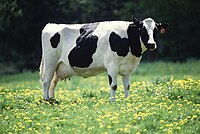
Photo from wikipedia
The dairy industry’s Farmers Assuring Responsible Management (F.A.R.M.) program expects annual employee training in cattle handling. Offering meaningful, accessible educational courses should be a priority of the industry as consumers… Click to show full abstract
The dairy industry’s Farmers Assuring Responsible Management (F.A.R.M.) program expects annual employee training in cattle handling. Offering meaningful, accessible educational courses should be a priority of the industry as consumers demand quality care for cattle from farm to table when they make purchasing decisions. In response to this industry expectation, SDSU Extension offered multiple formats for cattle handling trainings. Methods used with University students and dairy employees to teach skills of proper cattle handling as it relates to quality products and animal well-being will be discussed. The objective is to evaluate knowledge gained and present outcomes learned from the trainings. In 2018, cattle handling and a brief introduction to the F.A.R.M. program was taught in an upperclassman Physiology of Lactation course (n=25 students) through two 50-minute lectures and one 2-hour hands-on cattle lab. Students were evaluated using multiple-choice questions as part of an exam. In 2019, one 50-minute lecture introducing the F.A.R.M. program and one 2-hour lecture/hands-on cattle lab on basic stockmanship skills was presented to the underclassman Introduction to Dairy Science course (n=27 students). Students were evaluated using a 10-question lab worksheet with multiple-choice, true-false, and short answer questions plus seven questions on a later exam. The same year, a pre and post evaluation quiz was implemented with farm employees for cattle handling trainings on a commercial dairy (n=19 employees). Students in 2018 had an average score of 79.43%, while students in 2019 had an average score of 93.60% on the lab worksheet and 84.26% on the exam questions. The employee average score on the pre-test was 78.95% and 87.89% on the post-test. Students scored well overall. Despite improvement in the post-test scores, employees scored high on the pre-test. Further evaluation of cattle handling teaching methods using strategic assessments is needed to better understand whether implementation of proper skills is occurring from the knowledge learned. Adding follow-up accountability may enhance implementation of consistent proper care and maintain consumer confidence in dairy products.
Journal Title: Journal of Animal Science
Year Published: 2020
Link to full text (if available)
Share on Social Media: Sign Up to like & get
recommendations!